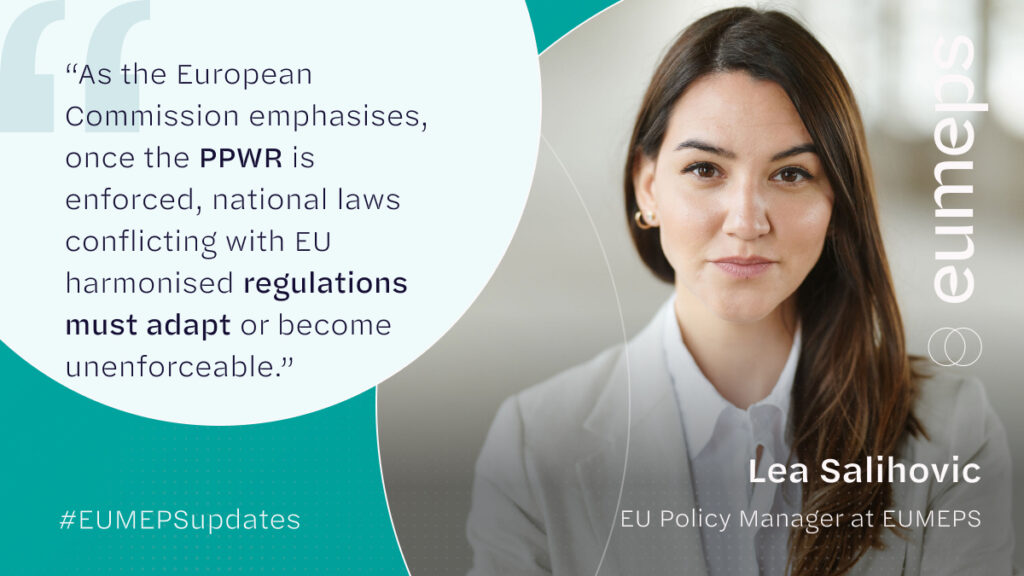Update on The Ban on Styrenic Packaging in France
The European Commission has confirmed that the planned ban on styrenic packaging in France, set for 2025 under the Climate and Resilience Law, will not be enforceable. This decision comes as the ban conflicts with the upcoming EU Packaging and Packaging Waste Regulation (PPWR), and no enforcement measures will be implemented, according to reliable sources. Moreover, a recent notice published in the Official Journal has clarified the definition of non-recyclable styrenic packaging in line with EU regulations.
Source: L’Usine Nouvelle.
Publication of Official Notice
The notice, published in the Official Journal on 30 September 2024, specifies that for the French Environment Code, non-recyclable styrenic packaging is defined as packaging that does not fall into recyclability performance classes A, B, or C as outlined in Article 6 of the draft PPWR. This aligns French law with the upcoming PPWR, which provides for recyclability to be assessed based on design-for-recycling criteria starting from 1 January 2030. The full text can be accessed here.
Conflict with European Regulations
Information obtained by Plastiques & Caoutchoucs Magazine reveals that the French ban on styrenic packaging, scheduled for 2025, cannot be applied due to its conflict with future European legislation. The European Commission has affirmed in writing that, upon the PPWR’s enforcement, any national laws in contradiction—such as the planned ban—will become inapplicable.
In a letter dated 28 August, the European Commission clearly stated that the PPWR will directly apply to national laws once it comes into force. This means any contradictory national legislation, including France’s proposed ban under the Climate and Resilience Law, will no longer be valid. The problem lies in the lack of clear criteria in the French law, which was not aligned with EU regulation, even though EPS and PS materials are recyclable.
No Inspections Planned
Furthermore, the French Directorate-General for Competition Policy, Consumer Affairs and Fraud Control (DGCCRF) will not enforce the ban through inspections. According to a well-informed source, the DGCCRF has stated it will not conduct checks to ensure compliance with the ban, as no conditions essential for enforcement have been established.
EU Notifications and Legislative Framework
In its response, the European Commission also emphasised that national texts establishing technical rules, which are currently under consideration at the European level, will be inapplicable if they have not been notified to the Commission, as required under Directive (EU) 2015/1535.
The PPWR is expected to be definitively adopted by the end of November 2024. Once in force, any national laws contradicting the PPWR will be under scrutiny. As the European Commission stated, “Once the regulation is in effect, Member States must adhere to EU rules and ensure their implementation. Compliance with the regulation is essential to maintain harmonised standards, foster cooperation, and uphold the integrity of the internal market.”
Harmonisation Across the EU
Lea Salihovic, EUMEPS EU Policy Manager, commented: “As the European Commission emphasises, once the PPWR is enforced, national laws conflicting with EU harmonised regulations must adapt or become unenforceable. This affects not only styrenic packaging and the Climate and Resilience Law but also key areas like reuse, recycled content, and prohibitions across the EU. A unified approach is crucial to prevent fragmentation and ensure the smooth functioning of the internal market.”

The European Commission’s stance highlights a fundamental point: when the PPWR comes into force, national legal frameworks that conflict with the EU’s harmonised regulations will need to adapt. If they do not, these national provisions will be unenforceable. This applies not only to the Climate and Resilience Law and styrenic packaging but also to other areas such as reuse, recycled content, and various prohibitions across the EU.
This situation underscores the importance of a unified European approach, ensuring that national regulations align with common EU rules to avoid fragmentation and ensure the smooth functioning of the internal market.
EUMEPS continues to advocate for the responsible use of EPS packaging and calls for policies that support innovation and recyclability across the sector. Stay informed about our latest initiatives by visiting our website.